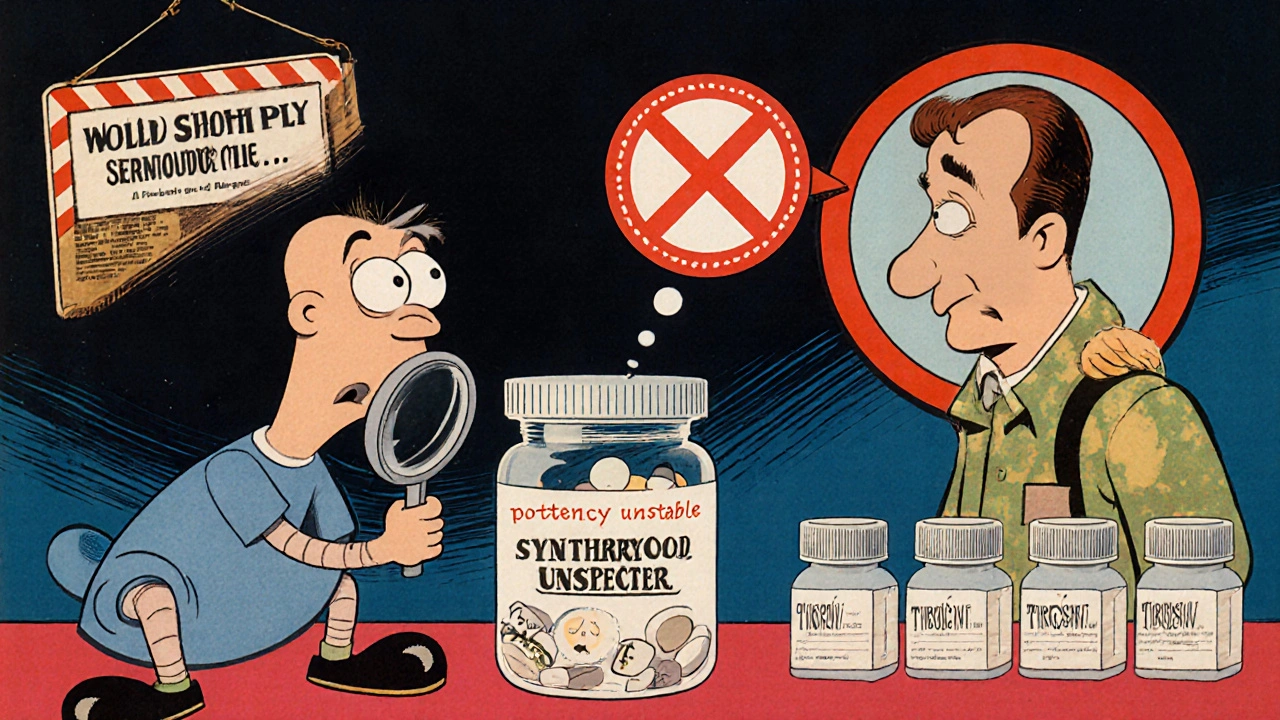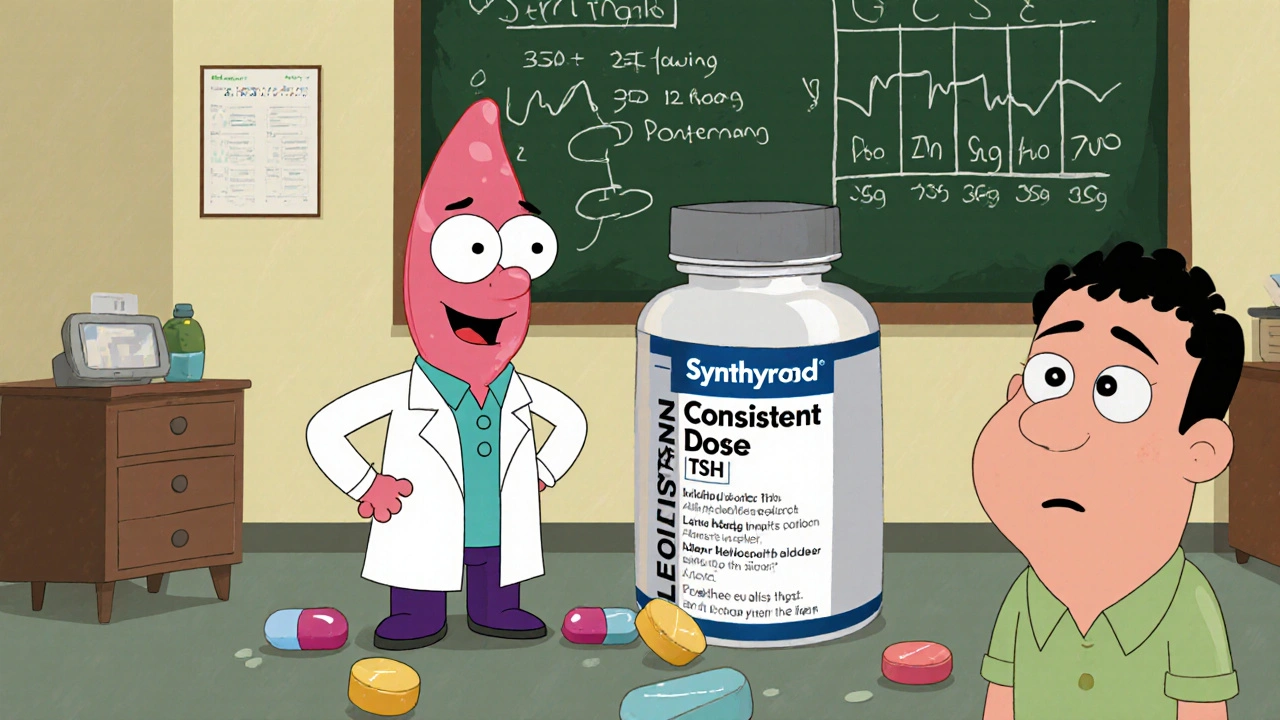When you’re told you need thyroid medication, Synthroid often comes up first. It’s the brand-name version of levothyroxine, and for decades, it’s been the go-to prescription for hypothyroidism. But here’s the thing: Synthroid isn’t the only option anymore. Generic levothyroxine, Tirosint, Unithroid, and even compounded versions are out there. And if you’ve ever switched between them - or thought about it - you know it’s not just about price. It’s about how your body reacts.
What Exactly Is Synthroid?
Synthroid is a brand-name medication containing levothyroxine as its active ingredient. It’s a synthetic form of the T4 hormone your thyroid gland normally makes. When your thyroid doesn’t produce enough - whether due to Hashimoto’s, surgery, or radiation - Synthroid replaces it. The goal? Keep your TSH levels between 0.5 and 2.5 mIU/L, according to the American Thyroid Association guidelines.
What makes Synthroid different isn’t the hormone itself. It’s the fillers. Synthroid uses lactose, acacia, and corn starch. These inactive ingredients might seem harmless, but for some people, they cause bloating, gas, or even allergic reactions. And because Synthroid is made under strict FDA controls, every tablet is nearly identical in potency. That consistency is why many doctors still start patients here.
Generic Levothyroxine: The Budget-Friendly Option
Generic levothyroxine is chemically identical to Synthroid. Same molecule. Same dose. Same effect - in theory. But in practice, it’s not always that simple.
A 2017 study published in JAMA Internal Medicine tracked over 10,000 patients who switched from Synthroid to generic. About 15% saw their TSH levels jump outside the target range within six months. That’s not because the generic was weak. It’s because different manufacturers use different fillers. One brand might use mannitol, another might use starch. These variations can change how your body absorbs the hormone.
Here’s what works for most people: stick with one brand - whether it’s Synthroid or a generic - and don’t switch unless you have to. If your doctor prescribes a generic, ask them to write "dispense as written" on the script. That stops pharmacies from swapping brands without telling you.
Cost-wise, generic levothyroxine is a win. At a major U.S. pharmacy chain, a 30-day supply of Synthroid 75 mcg costs about $45 without insurance. The same dose of generic? Around $12. That’s a 70% savings. For people on fixed incomes or without coverage, that matters.
Tirosint: The Capsule Alternative
Tirosint is different. Instead of a tablet, it comes in a softgel capsule filled with liquid levothyroxine. The capsule shell is made of gelatin and glycerin - no lactose, no gluten, no artificial dyes. That makes it ideal for people with sensitivities to fillers, or those with celiac disease or severe allergies.
One study in the Journal of Clinical Endocrinology & Metabolism found that patients who switched from Synthroid to Tirosint saw more stable TSH levels, especially those with malabsorption issues like Crohn’s or gastric bypass patients. Why? Liquid levothyroxine absorbs more predictably in the gut than solid tablets.
But there’s a catch: Tirosint costs about $120 for a 30-day supply. That’s 10 times more than generic. Insurance often doesn’t cover it unless you’ve tried and failed with other forms. Some patients report better energy and mood on Tirosint - not because it’s "stronger," but because their absorption improved.

Unithroid and Other Brand Names
Unithroid is another brand-name levothyroxine, similar to Synthroid in formulation. It’s less common now, but still available. Some endocrinologists prefer it for patients who’ve had trouble with Synthroid’s fillers but can’t afford Tirosint.
Other brands like Levoxyl and Euthyrox exist too, especially outside the U.S. Levoxyl uses calcium carbonate as a filler, which can interfere with absorption if taken with calcium supplements. Euthyrox, popular in Europe, has a slightly different manufacturing process but is considered equivalent by the WHO.
Bottom line: if you’re doing well on a brand, don’t switch. If you’re not - and you’ve ruled out diet, timing, or other medications - then it might be the formulation.
Compounded Levothyroxine: Is It Worth It?
Some clinics and pharmacies offer compounded levothyroxine. These are custom-made formulas, often with no fillers at all. They’re marketed as "cleaner," "personalized," or "bio-identical." But here’s the truth: compounded versions aren’t FDA-approved. That means there’s no guarantee the dose is accurate from one batch to the next.
A 2021 FDA review found that 20% of compounded levothyroxine samples had potency levels outside the acceptable range. That’s dangerous. Too little and your TSH stays high. Too much and you risk heart palpitations or bone loss.
Compounded versions might make sense for people with rare allergies to every known filler. But even then, Tirosint or a carefully chosen generic is usually safer. Don’t pay $200 a month for something that might not even be consistent.
How to Choose the Right One for You
There’s no single best option. It depends on your body, your budget, and your lifestyle.
- If you’re cost-sensitive and have no sensitivities: start with generic levothyroxine. Stick with one brand. Get your TSH checked after 6 weeks.
- If you have allergies, celiac, or gut issues: Tirosint is worth the cost. Many patients report feeling better within 4-6 weeks.
- If you’ve switched brands and feel worse: go back to what worked. Don’t assume the new one is better.
- If you’re pregnant or planning to be: Synthroid or Tirosint are preferred. Studies show more stable levels during pregnancy with brand-name products.
- If you’re taking iron, calcium, or PPIs: take your thyroid med 4 hours apart. That matters more than the brand.
Also, take your pill on an empty stomach, at the same time every day. Coffee, food, and even soy milk can block absorption. That’s often the real reason people think their medication isn’t working.

What Doctors Don’t Always Tell You
Many doctors treat levothyroxine like a simple switch: one pill, one dose, done. But thyroid hormone is one of the most sensitive drugs in medicine. A 12.5 mcg difference - less than a grain of salt - can shift your TSH from normal to high.
That’s why regular blood tests matter. Don’t wait for symptoms to return. Get your TSH, free T4, and sometimes free T3 checked every 6-8 weeks after a dose change. Once you’re stable, twice a year is enough.
And if you’re still tired, gaining weight, or feeling depressed despite normal labs - don’t blame yourself. Ask about reverse T3, adrenal function, or iron deficiency. Hypothyroidism rarely lives alone.
Final Thoughts: It’s Not About Brand, It’s About Consistency
Synthroid isn’t magic. Generic levothyroxine isn’t inferior. Tirosint isn’t superior for everyone. What matters is finding the form your body tolerates - and sticking with it.
Most people do fine on generic. Some need Tirosint. A few need to avoid all fillers. But no one needs to spend hundreds a month unless they have a real medical reason.
If you’re unsure, ask your pharmacist: "Which generic are you giving me today?" Write it down. Next refill, ask again. If it changes, tell your doctor. That simple habit can prevent weeks of unexplained fatigue.
Your thyroid doesn’t care if the pill says Synthroid or generic. It only cares if it gets the right dose - every day, the same way.
Can I switch from Synthroid to generic without problems?
Many people switch without issues, but about 1 in 7 experience changes in TSH levels. If you switch, get your blood tested 6 weeks later. Stick with one generic brand once you find one that works.
Is Tirosint better than Synthroid?
Tirosint isn’t stronger - it’s more predictable in absorption, especially for people with gut problems or allergies. If you’ve had trouble with tablets, it’s worth trying. But if you’re doing well on Synthroid, there’s no need to switch.
Why does my thyroid medication seem less effective sometimes?
It’s rarely the medication. More often, it’s timing. Taking it with food, coffee, calcium, or iron can block absorption. Take it on an empty stomach, 30-60 minutes before eating, and wait 4 hours before taking supplements.
Are compounded thyroid pills safe?
They’re not FDA-approved, and potency can vary between batches. A 2021 FDA review found 20% of samples were outside safe limits. Only consider them if you have severe allergies to all standard fillers - and even then, talk to your doctor first.
How often should I get my thyroid levels checked?
After starting or changing dose: every 6-8 weeks. Once stable: twice a year. If you’re pregnant, get tested every 4-6 weeks until delivery. TSH targets change during pregnancy.
What to Do Next
Don’t guess. Don’t switch randomly. If you’re on Synthroid and feel fine - keep taking it. If you’re on generic and feel fine - great. If you’re struggling, talk to your doctor about trying Tirosint or switching to a consistent generic.
Keep a log: note your dose, when you take it, and how you feel each week. Bring it to your next appointment. That kind of detail helps your doctor see patterns you might miss.
Thyroid treatment isn’t one-size-fits-all. But it doesn’t have to be complicated. Just be consistent. Track your results. And don’t let cost or convenience override what your body actually needs.


Stacey Whitaker
I switched from Synthroid to generic and felt like a zombie for three weeks. Then I switched back. My doctor acted like it was all in my head. Turns out, my body just hates the fillers. Now I’m on Tirosint and I finally sleep through the night. No more brain fog. No more crying over spilled coffee. Just peace. 🙌
Kayleigh Walton
For anyone considering a switch, please don’t just swap without checking your labs. I went from Synthroid to a cheap generic and my TSH spiked to 8.5. I thought I was just stressed. Turns out, my thyroid was screaming. Get tested 6 weeks after any change. It’s not expensive, and it could save you months of fatigue.
Stephen Tolero
The JAMA study cited has a 95% CI of ±1.7% for TSH variation. The clinical significance of minor fluctuations is often overstated. Consistency matters more than brand.
Brooklyn Andrews
Stop acting like generics are dangerous. You’re just used to paying $45 for a pill that costs 12 cents to make. If your body can’t handle a different filler, that’s not the drug’s fault-it’s your sensitivity. Get over it.
Joanne Haselden
As an endocrinology nurse practitioner, I’ve seen patients thrive on generics, struggle on Synthroid, and find liberation with Tirosint. The key isn’t the brand-it’s absorption stability. For those with GI comorbidities, liquid formulations are game-changers. But never assume without testing. TSH, FT4, and sometimes FT3. Always FT3 if fatigue persists.
Vatsal Nathwani
Why are you all so obsessed with pills? Just eat more seaweed and chill. You’re all overmedicated.
Saloni Khobragade
compounded thyroid pills are the best!! i switched and my energy is 1000% better!! no fillers!! why do doctors hate us??
Sean Nhung
Just had my TSH checked last week-back to 1.8 after switching to generic. Took 2 months, but now I’m stable. Also, I take it at 5 AM with a big glass of water and don’t eat until 7. It’s weird, but it works. ☕️💊
kat pur
My mom switched to Tirosint after 10 years of Synthroid and finally lost the 15 pounds she couldn’t shed. She said it was like waking up after 20 years of sleepwalking. Not magic. Just consistency. And listening to your body.
Vivek Mishra
Synthroid is overrated. All levothyroxine is the same. Pharma just wants you to pay more.
thilagavathi raj
My doctor refused to let me try Tirosint. Said it was "not medically necessary." So I paid out of pocket. Now I’m not crying in the shower every Tuesday. They don’t get it. They never do.
Sandridge Neal
For those considering a switch, please consult your pharmacist. They are the unsung heroes of medication consistency. Ask which generic you’re receiving, and request a log. A simple change in manufacturer can alter absorption kinetics significantly. Document everything. Your future self will thank you.
Diane Thompson
I’ve been on the same generic for 5 years. Never had an issue. Everyone else is just overthinking it. It’s a pill. Take it. Stop making it a drama.
Helen Moravszky
OMG I JUST REALIZED I’VE BEEN TAKING MY PILLS WITH MY MORNING SMOOTHIE 😭 I switched to taking it before coffee and I feel like a new person. Also, I started writing down how I feel each day. It’s weirdly empowering. Who knew?
Reginald Matthews
I was skeptical about Tirosint until my TSH dropped from 4.2 to 1.9 in 8 weeks. I have Crohn’s, so absorption has always been a mess. The cost is brutal, but my quality of life improved faster than any medication I’ve tried. Worth every penny. Not because it’s "better"-because it works for my body.